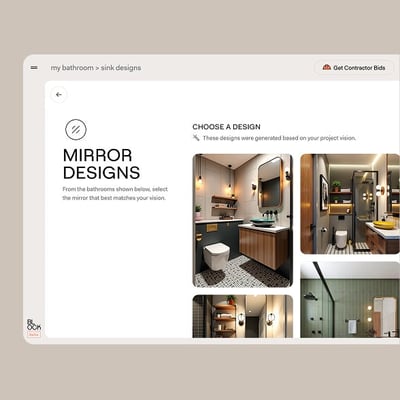
Bathroom
Small Luxury Bathroom Design Ideas
01.29.2026


In This Article
Choosing the best material for your shower walls is about much more than just looks. The option you select will shape your daily routine, influence how much time you spend cleaning, and even affect the long-term value and durability of your bathroom. There’s no single “best” option—what works for one homeowner may not suit another. Instead, the smartest choice is the one that fits your lifestyle, your maintenance preferences, and your vision for the space.
Design a Home That’s Uniquely Yours
Block can help you achieve your renovation goals and bring your dream remodel to life with price assurance and expert support.
Get Started
Overview: Shower tiles are individual pieces—typically ceramic, porcelain, or natural stone—installed in patterns or layouts across your shower walls. They’re the traditional choice and remain popular for their versatility and timeless appeal.
Pros of Ceramic and Porcelain Tiles Shower Tiles
Design versatility: Tile offers unmatched design flexibility, allowing you to create anything from a simple, clean look to a bold, artistic statement. With a wide range of colors, shapes, and finishes, you can tailor your shower to match any style, from mid-century modern to classic or contemporary.
Widespread appeal: If you were to poll a broad group of homeowners about the best shower wall material, traditional tiles would almost certainly top the list. While their popularity is partly due to how familiar and widely available they are, tile also offers a classic versatility that never goes out of style. In turn, this specific shower wall option is almost guaranteed not to scare away future home buyers.
Durability: Tiles are highly durable and, when installed and maintained properly, can last for decades. They’re also heat- and water-resistant, making them a practical choice for wet environments. For older homes, tile can help preserve or echo original architectural details, adding character and value.
Cons of Shower Tiles
Maintenance needs: The main drawback of tile is maintenance. Grout lines can attract mold and mildew, requiring regular cleaning and periodic resealing to stay fresh and watertight.
Complex installation: Installation is labor-intensive and requires a skilled professional to ensure a proper, leak-free finish. Tile projects can also become costly, especially if you choose custom designs or premium materials like marble. While tiles themselves are durable, they can crack or chip if struck, and repairs may be noticeable if an exact match isn’t available.
Best shower wall option for: Homeowners seeking a traditional look with customizable design options.

Overview: Large-format porcelain panels are oversized slabs of porcelain designed to cover entire shower walls with minimal seams. This material mimics the look of stone or tile but offers a sleek, modern, and nearly grout-free surface.
Pros of Large-Format Porcelain Panels
Easy maintenance: These panels create a seamless, contemporary look that’s easy to clean, thanks to the lack of grout lines.
Highly resilient; Porcelain is non-porous, highly resistant to stains, scratches, and water, and available in a variety of finishes—including realistic stone and concrete effects. Installation is often faster than traditional tile, and the panels are lighter than natural stone, making them suitable for most homes.
Overall attractive: For those seeking to create a spa-like or Scandinavian-themed bathroom, large-format porcelain panels may be the best shower wall material, providing the desired aesthetic but with low maintenance needs.
Cons of Large-Format Porcelain Panels
More expensive than other shower wall options: Installation requires specialized skills and tools, which can increase labor costs. The panels themselves are often more expensive than standard tile, and not all contractors are experienced with this material. If a panel is damaged, replacing it is more complicated and costly than swapping out a single tile.
Less aesthetic versatility: Design options, while growing, are still more limited than with traditional tile, and customization is less flexible.
Best shower wall option for: Homeowners who desire the look of natural stone but without significant cleaning requirements.

Overview: Solid-surface surrounds are manufactured shower wall panels made from materials like acrylic, cultured marble, or engineered composites. They’re custom-fabricated to fit your shower and installed as large, seamless sections.
Pros of Solid-Surface Surrounds
Easy cleaning: Solid-surface surrounds are prized for their smooth, grout-free finish, which makes cleaning a breeze. These materials are non-porous, so they resist mold, mildew, and staining, and they’re available in a range of colors and subtle patterns.
Easy installation: Installation is typically quicker and less disruptive than tile, and panels can be custom-made to fit unique shower shapes or retrofits. For homeowners who want a modern, low-maintenance solution, solid-surface surrounds are a practical and attractive option.
Cons of Solid-Surface Surrounds
Less resilient than other shower wall alternatives: While durable, these materials can scratch, and deeper damage may require professional repair.
Can appear "cheap": The look is generally more uniform and less customizable than tile and other shower wall alternatives, which may not appeal to those seeking a highly personalized or textured design. Some options can feel less substantial compared to stone or tile, and color choices, while improving, are still more limited.
Best For: Those looking for a sleek, low-maintenance shower wall solution that is considered relatively affordable.
Know the Cost Before You Start

Pros of Acrylic Panels
Cons of Acrylic Panels

Overview: Glass panels for shower walls are typically made from thick, tempered glass and can be clear, frosted, or textured. They’re often used for a sleek, modern look and to maximize light in the shower area.
Pros of Glass Panels
Cons of Glass Panels
Best for: Homeowners who want a contemporary, light-filled shower with minimal visual barriers.
Overview: Natural stone shower walls use slabs or tiles of materials like marble, granite, or slate, offering a luxurious, organic look. Each piece is unique, with natural veining and color variations.
Pros of Natural Stone
Cons of Natural Stone
Best for: Homeowners seeking a high-end, one-of-a-kind shower with a natural, luxurious feel—and who are willing to invest in ongoing maintenance.
Overview: Waterproof wall systems use interlocking panels made from materials like high-quality laminate, PVC, or fiberglass. These systems are engineered for quick installation and maximum water resistance.
Pros of Waterproof Wall Systems
Cons of Waterproof Wall Systems
Best for: Homeowners who want a fast, budget-friendly, and low-maintenance shower wall solution.
Perfect Every Detail of Your Bathroom

Wondering how various shower wall materials will transform your space? With our free Bathroom Remodel Visualizer, you can explore everything from timeless tile to modern panels—all from the comfort of home. Just upload a photo of your bathroom, try out different materials and colors, and see instant, realistic renderings of your selections. It’s a fast, intuitive way to discover which shower wall option truly matches your style and vision.
Try Out Our Free AI Bathroom Remodel Visualizer
Of course, looks aren’t everything. Determine which shower materials and design choices may best align with your bathroom remodeling budget with guides like:
Selecting the best shower wall material for your lifestyle and bathroom aesthetic is a significant decision, but you don’t have to make it alone. Block Renovation combines deep expertise, a highly selective network of contractors, and a commitment to clear, honest guidance at every stage of your project. We help you thoughtfully weigh the pros and cons of each option, always considering both your design goals and budget.
From inspiration to installation, Block ensures your shower remodel is managed with care, transparency, and genuine respect for your vision. Our team is here to answer your questions, offer personalized recommendations, and connect you with professionals known for their quality craftsmanship. From North Jersey to San Jose, we’ve connected countless homeowners with trusted local contractors who deliver bathroom renovations on time and within budget.
With Block, you receive more than just a beautiful new shower—you gain a renovation experience centered on your needs, your style, and your peace of mind.
Renovate with confidence every step of the way
Step 1: Personalize Your Renovation Plan
Step 2: Receive Quotes from Trusted Contractors
Step 3: Let Us Handle the Project Details


Written by Block Renovation
What is the most durable material for shower walls?
Are acrylic panels better than tiles?
How often should I seal natural stone shower walls?
Can I install shower wall panels myself?
What is the easiest shower wall material to clean?

Renovate confidently with Block
Easily compare quotes from top quality contractors, and get peace of mind with warranty & price protections.
Thousands of homeowners have renovated with Block

4.5 Stars (100+)

4.7 Stars (100+)

4.5 Stars (75+)

Bathroom
Small Luxury Bathroom Design Ideas
01.29.2026
.jpg?width=640&name=5301c89b-3165-4f83-af34-a6b02eaa6c48%20(1).jpg)
Bathroom
Remodeling a Bathroom Into a Wet Room - Costs & Considerations
01.20.2026
.webp?width=640&name=d8151090-d347-11eb-9d1d-3514adcc0bb1%20(1).webp)
Bathroom
Bathtub Material Comparison: Fiberglass, Porcelain & More
01.20.2026
.jpg?width=640&name=7bacb6ea-82dc-403c-8e9a-191d2fb45b55%20(1).jpg)
Bathroom
Economical Bathroom Remodel Strategies
01.08.2026

Bathroom
Bathroom Mirror Trends to Inspire Your Ideas
01.07.2026
Renovate confidently